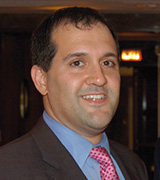- “La Parisienne” Goes to the Opera: Maria Callas as Priestess
- Over 40 US Policymakers Commemorate the 50th Dark Anniversary of the Turkish invasion in Cyprus at 39th Annual PSEKA Conference
- Remembering The Turkish Invasion of Cyprus and The Fight to Flee with Famagusta Native and Founder of Aktina FM Elena Maroulleti
- Marc Chagall And Greece: A Love Story
- $17 Million AHEPA Gift Will Open Doors For A Generation Of Students
A Dinner in Europe

Endy Zemenides
Students of American constitutional history may find much familiar in the present economic and political crises in Europe. The original United States of America may have been even less united than today’s Europe: they often argued amongst themselves, refused to financially support the national government, imposed tariffs on one another, and used different currencies. Some states began making agreements with foreign governments and most had their own military.
In 1786, the young U.S.A. was dealing with a post-war economic depression, one that was made worse by a credit squeeze caused by a lack of hard currency, and fiscally harsh government policies instituted in 1785 to solve the state’s debt problems to rising debt. The result? Shays’ Rebellion – an armed revolt against the national government. The national government was unable to gather a combined military force amongst the states to help put down the rebellion.
The economic, military, and institutional weakness that became apparent because of this economic/debt crisis led to a reset in the American experiment and the U.S. Constitution. The rest is obviously history. Part of that history is not as well known. It is a history of extraordinary statesmanship. Even under the new Constitution, the young nation struggled to develop a financial plan that would make it a united whole. At issue? The assumption of state debt by the federal government.
At the time, southern Congressmen (led by Virginia) opposed such an assumption. Alexander Hamilton was promoting the assumption of debt from within the Washington presidency. He faced such opposition that he believed the country faced certain financial ruin. It was at this moment that Thomas Jefferson hosted a dinner between Madison and Hamilton, where a compromise was reached that made the United States as we know it possible. Madison would not dissuade Congressmen that followed him from voting for the plan, and the new capital (today’s Washington, D.C.) would be located on the Potomac River, something that the Virginia delegation wanted very much. This moment has been memorialized as “The Dinner” by the great hagiographer of the Founding Fathers, Joseph Ellis.
It is this type of statesmanship that has been conspicuously absent during the European economic crisis. Could you imagine if Virginia decided to hash out the future of the United States with the creditors of its fellow states rather than with the states themselves? Even with four of the first five Presidents (Washington, Jefferson, Madison, Monroe) and dominance in the House of Representatives, did Virginia subjugate its fellow states? What if Virginia (Madison) and New York (Hamilton) looked out for their interests only instead of the interests of the Union?
If you are indeed contemplating answers to these questions, look at Europe today. Germany – which is in the same position that Virginia was then – has adopted quite a different strategy than our Founding Fathers from that state. Britain, who one can argue is Europe’s version of New York, is seriously contemplating exiting the union altogether rather than participate in the true integration that the continent requires. And instead of searching for an honest broker that could host the 21st Century version of the Dinner (hello, President Obama?), Chancellor Merkel further undermines Europe by dining with Sultan Erdogan of Turkey and compromising European values, European allies, and European democracy for short term gain.
Bret Stephens of The Wall Street Journal lambasted this selling out of Europe by Merkel in Erdogan’s palace, arguing that “the death of Europe is in sight.” In my last column in this space, I argued that Greece needs to prepare for this eventuality by looking even further West to the United States, but the death of Europe would be a geopolitical catastrophe for the world. President Obama and Secretary Kerry are legacy shopping in foreign affairs, they should host a dinner between northern Europe and southern Europe.











0 comments